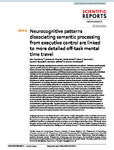Neurocognitive patterns dissociating semantic processing from executive control are linked to more detailed off-task mental time travel
| dc.contributor.author | Wang, H-T | |
| dc.contributor.author | Ho, Nerissa | |
| dc.contributor.author | Bzdok, D | |
| dc.contributor.author | Bernhardt, BC | |
| dc.contributor.author | Margulies, DS | |
| dc.contributor.author | Jefferies, E | |
| dc.contributor.author | Smallwood, J | |
| dc.date.accessioned | 2020-09-16T12:04:35Z | |
| dc.date.available | 2020-09-16T12:04:35Z | |
| dc.date.issued | 2020-07-17 | |
| dc.identifier.issn | 2045-2322 | |
| dc.identifier.issn | 2045-2322 | |
| dc.identifier.other | 11904 | |
| dc.identifier.uri | http://hdl.handle.net/10026.1/16366 | |
| dc.description.abstract |
<jats:title>Abstract</jats:title><jats:p>Features of ongoing experience are common across individuals and cultures. However, certain people express specific patterns of thought to a greater extent than others. Contemporary psychological theory assumes that individual differences in thought patterns occur because different types of experience depend on the expression of different neurocognitive processes. Consequently, individual variation in the underlying neurocognitive architecture is hypothesised to determine the ease with which certain thought patterns are generated or maintained. Our study (N = 178) tested this hypothesis using multivariate pattern analysis to infer shared variance among measures of cognitive function and neural organisation and examined whether these latent variables explained reports of the patterns of on-going thoughts people experienced in the lab. We found that relatively better performance on tasks relying primarily on semantic knowledge, rather than executive control, was linked to a neural functional organisation associated, via meta-analysis, with task labels related to semantic associations (sentence processing, reading and verbal semantics). Variability of this functional mode predicted significant individual variation in the types of thoughts that individuals experienced in the laboratory: neurocognitive patterns linked to better performance at tasks that required guidance from semantic representation, rather than those dependent on executive control, were associated with patterns of thought characterised by greater subjective detail and a focus on time periods other than the here and now. These relationships were consistent across different days and did not vary with level of task demands, indicating they are relatively stable features of an individual’s cognitive profile. Together these data confirm that individual variation in aspects of ongoing experience can be inferred from hidden neurocognitive architecture and demonstrate that performance trade-offs between executive control and long-term semantic knowledge are linked to a person’s tendency to imagine situations that transcend the here and now.</jats:p> | |
| dc.format.extent | 11904- | |
| dc.format.medium | Electronic | |
| dc.language | en | |
| dc.language.iso | en | |
| dc.publisher | Springer Science and Business Media LLC | |
| dc.subject | Adolescent | |
| dc.subject | Adult | |
| dc.subject | Brain Cortical Thickness | |
| dc.subject | Cognition | |
| dc.subject | Executive Function | |
| dc.subject | Female | |
| dc.subject | Humans | |
| dc.subject | Male | |
| dc.subject | Semantics | |
| dc.subject | Task Performance and Analysis | |
| dc.subject | Time Factors | |
| dc.subject | Young Adult | |
| dc.title | Neurocognitive patterns dissociating semantic processing from executive control are linked to more detailed off-task mental time travel | |
| dc.type | journal-article | |
| dc.type | Journal Article | |
| dc.type | Research Support, Non-U.S. Gov't | |
| plymouth.author-url | https://www.webofscience.com/api/gateway?GWVersion=2&SrcApp=PARTNER_APP&SrcAuth=LinksAMR&KeyUT=WOS:000550002600008&DestLinkType=FullRecord&DestApp=ALL_WOS&UsrCustomerID=11bb513d99f797142bcfeffcc58ea008 | |
| plymouth.issue | 1 | |
| plymouth.volume | 10 | |
| plymouth.publication-status | Published online | |
| plymouth.journal | Scientific Reports | |
| dc.identifier.doi | 10.1038/s41598-020-67605-2 | |
| plymouth.organisational-group | /Plymouth | |
| plymouth.organisational-group | /Plymouth/Faculty of Health | |
| plymouth.organisational-group | /Plymouth/Faculty of Health/School of Psychology | |
| plymouth.organisational-group | /Plymouth/REF 2021 Researchers by UoA | |
| plymouth.organisational-group | /Plymouth/REF 2021 Researchers by UoA/UoA04 Psychology, Psychiatry and Neuroscience | |
| plymouth.organisational-group | /Plymouth/REF 2021 Researchers by UoA/UoA04 Psychology, Psychiatry and Neuroscience/UoA04 Psychology, Psychiatry and Neuroscience MANUAL | |
| plymouth.organisational-group | /Plymouth/Users by role | |
| plymouth.organisational-group | /Plymouth/Users by role/Academics | |
| dc.publisher.place | England | |
| dcterms.dateAccepted | 2020-06-08 | |
| dc.rights.embargodate | 2020-10-23 | |
| dc.identifier.eissn | 2045-2322 | |
| dc.rights.embargoperiod | Not known | |
| rioxxterms.versionofrecord | 10.1038/s41598-020-67605-2 | |
| rioxxterms.licenseref.uri | http://www.rioxx.net/licenses/all-rights-reserved | |
| rioxxterms.licenseref.startdate | 2020-07-17 | |
| rioxxterms.type | Journal Article/Review |


